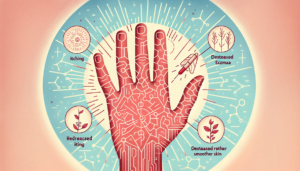If you’ve ever experienced the discomfort of herpes on your skin, you know how challenging it can be to find an effective treatment. With the constant itching, burning, and blisters, it’s essential to find a solution that provides relief and promotes healing. In this article, we will explore various options for herpes on skin treatment so that you can finally find the relief you’ve been searching for. From home remedies to medical interventions, we’ve got you covered with everything you need to know about managing and treating herpes on the skin.


Herpes on Skin Treatment
Understanding Herpes on Skin
Herpes on the skin is a common viral infection caused by the herpes simplex virus (HSV). When infected, you may experience painful blisters or sores on various parts of your body, such as the lips, face, genitals, or anus. Understanding the condition is crucial in finding effective treatment methods.
Types of Herpes Infections
There are two types of herpes infections: herpes simplex virus type 1 (HSV-1) and herpes simplex virus type 2 (HSV-2). HSV-1 typically causes oral herpes, while HSV-2 is commonly associated with genital herpes. However, both types can infect either location. It is important to note that the infection can be transmitted through sexual or non-sexual contact.
Diagnosis of Herpes on Skin
Diagnosing herpes on the skin usually involves a physical examination and a review of your medical history. In some cases, your healthcare provider may also perform a laboratory test to confirm the presence of the virus. This may include a viral culture, polymerase chain reaction (PCR) test, or blood test. It is important to seek medical attention for an accurate diagnosis before starting any treatment.
Medical Treatments
Antiviral Medications
Antiviral medications are the primary treatment for herpes on the skin. They work by reducing viral replication and relieving symptoms. These medications, such as acyclovir, valacyclovir, and famciclovir, can be taken orally or applied topically. They are generally effective in reducing the duration and severity of outbreaks. It is important to start treatment as soon as possible after the onset of symptoms.
Topical Creams and Ointments
Topical creams and ointments can help alleviate the discomfort and promote healing of herpes sores on the skin. These over-the-counter options usually contain antiviral ingredients or natural substances like aloe vera and lemon balm. Applying these creams directly to the affected area can provide temporary relief and aid in the healing process.
Oral Medications
Oral medications, such as nonsteroidal anti-inflammatory drugs (NSAIDs), can help reduce pain and inflammation associated with herpes on the skin. These medications can provide relief from discomfort and promote healing. However, it is essential to consult with your healthcare provider before taking any oral medications to ensure they are safe and suitable for your specific situation.
Intravenous (IV) Antiviral Therapy
In severe cases of herpes on the skin, intravenous (IV) antiviral therapy may be necessary. This treatment involves administering antiviral medications directly into your bloodstream through an IV drip. IV therapy is typically reserved for individuals with compromised immune systems or those experiencing extensive and recurrent outbreaks. It is important to consult with a healthcare professional to determine if this treatment option is appropriate for you.
Suppressive Therapy
Suppressive therapy involves taking antiviral medications on a daily basis to prevent or minimize herpes outbreaks. This treatment approach is commonly recommended for individuals who experience frequent or severe outbreaks. By taking antiviral medication regularly, the viral load is kept low, reducing the frequency and severity of outbreaks. It is important to discuss suppressive therapy with your healthcare provider to determine the most appropriate dosage and duration for your specific situation.
Alternative Treatments
Lysine Supplements
Lysine is an amino acid that has been studied for its potential benefits in managing herpes outbreaks. Some research suggests that lysine supplements may help reduce the frequency and duration of outbreaks. It is believed that lysine works by inhibiting the replication of the herpes virus. However, more research is needed to fully validate these claims.
Aloe Vera Gel
Aloe vera gel has been used for centuries for its healing properties. Applying aloe vera gel topically to herpes sores on the skin may help soothe the area, reduce inflammation, and promote faster healing. It is important to choose a high-quality, pure aloe vera gel and apply it gently to the affected area.
Tea Tree Oil
Tea tree oil is renowned for its antiviral and antibacterial properties. Applying diluted tea tree oil topically to herpes sores on the skin may help alleviate symptoms and speed up the healing process. It is essential to dilute tea tree oil before application to prevent skin irritation. Consult with a healthcare professional for guidance on proper dilution and usage.
Manuka Honey
Manuka honey is a potent natural remedy known for its antibacterial and wound-healing properties. Applying manuka honey topically to herpes sores on the skin may promote healing and provide relief from discomfort. Look for medical-grade manuka honey with a high UMF (Unique Manuka Factor) rating for the best results.
Echinacea
Echinacea is an herbal supplement that is believed to enhance the immune system and potentially have antiviral properties. While research on its effectiveness in managing herpes on the skin is limited, some individuals may find it helpful in reducing the frequency and severity of outbreaks. Consult with a healthcare professional before starting any herbal supplements.
Lemon Balm
Lemon balm, also known as Melissa officinalis, is an herb that has been traditionally used to treat viral infections, including herpes. Applying lemon balm cream or ointment directly to the affected area may help reduce symptoms and promote healing. However, it is important to choose a product specifically formulated for herpes treatment.
Oregano Oil
Oregano oil contains potent antiviral compounds, and some individuals believe it may help manage herpes outbreaks. Diluted oregano oil can be applied topically to the affected area. However, oregano oil can be irritating to the skin, so it is crucial to dilute it properly and perform a patch test before use.


Prevention and Lifestyle
Safe Practices During Sexual Activities
Practicing safe sex is essential in preventing the transmission of herpes on the skin. Using barrier methods, such as condoms or dental dams, can significantly reduce the risk of spreading the virus. It is important to have open and honest communication with your partner about your herpes infection to establish mutual trust and ensure proper protection.
Proper Hygiene and Skin Care
Maintaining good hygiene and proper skin care can help prevent herpes outbreaks and reduce the risk of complications. Gentle cleansing with mild, fragrance-free soaps and warm water is recommended. Avoid using harsh or scented products that may irritate the skin. Keeping the affected area clean and dry can also promote faster healing.
Boosting the Immune System
A strong immune system plays a vital role in preventing and managing herpes outbreaks. Adopting a healthy lifestyle that includes regular exercise, sufficient sleep, and a balanced diet rich in fruits, vegetables, and immune-boosting nutrients can strengthen your immune system and minimize the frequency of outbreaks.
Stress Management
Stress is a known trigger for herpes outbreaks. Finding effective stress management techniques, such as exercise, yoga, meditation, or engaging in hobbies, can help reduce stress levels and lower the risk of outbreaks. It is important to find healthy coping mechanisms that work for you and incorporate them into your daily routine.
Healthy Diet and Exercise
Maintaining a healthy diet and engaging in regular physical activity contribute to overall well-being and can have a positive impact on managing herpes outbreaks. Eating a balanced diet that includes immune-boosting foods and avoiding excessive alcohol and processed foods can help support your immune system and improve your overall health.
Home Remedies
Warm Compress
Applying a warm compress to herpes sores on the skin can help relieve pain, reduce inflammation, and promote healing. Soak a clean towel in warm water, wring out the excess, and gently apply it to the affected area for 10-15 minutes at a time. Make sure to wash the towel thoroughly after use to prevent spreading the virus.
Epsom Salt Baths
Taking a warm bath with Epsom salt can provide relief from discomfort and help promote healing. Dissolve half a cup of Epsom salt in warm water and soak in the bath for 15-20 minutes. Gently pat yourself dry after the bath and avoid rubbing the affected area.
Ice Packs
Using ice packs can help alleviate pain and reduce inflammation associated with herpes sores on the skin. Wrap a few ice cubes in a thin towel and apply the ice pack to the affected area for 10-15 minutes at a time. Be sure to have breaks between applying the ice pack to prevent skin damage.
Cornstarch or Baking Soda
Cornstarch or baking soda can be used as a drying agent to help absorb moisture from herpes sores, preventing further irritation. Lightly dust the affected area with cornstarch or baking soda several times a day and repeat as necessary. Avoid excessive application to prevent skin dryness.
Lysine-Rich Diet
Incorporating lysine-rich foods into your diet may help manage herpes outbreaks. Foods rich in lysine include fish, chicken, eggs, dairy products, legumes, and certain fruits and vegetables. Consuming these foods regularly can contribute to maintaining a balance between lysine and arginine, an amino acid that may trigger outbreaks.
Herbal Teas
Drinking herbal teas, such as chamomile or peppermint tea, may provide soothing relief from discomfort and help boost your immune system. These teas can be consumed hot or cold and can be enjoyed multiple times a day for added benefits.
Echinacea and Goldenseal
Taking herbal supplements, such as echinacea and goldenseal, may help support your immune system and potentially reduce the frequency and severity of herpes outbreaks. However, it is important to consult with a healthcare professional before starting any herbal treatments to ensure they are safe and suitable for your specific condition.
Self-Care Tips
Avoid Scratching or Picking
It is crucial to avoid scratching or picking at herpes sores on the skin. Picking at the sores can increase the risk of bacterial infection, delay healing, and worsen symptoms. If you feel the need to touch the affected area, make sure to wash your hands thoroughly before and after.
Keep the Area Clean and Dry
Maintaining proper hygiene is essential in managing herpes on the skin. Clean the affected area gently with mild, fragrance-free soap and warm water, then pat dry with a clean towel. Avoid rubbing the area, as this can cause further irritation. Keeping the area clean and dry can help promote healing and prevent the spread of the virus.
Use Mild, Fragrance-Free Soaps
Using mild, fragrance-free soaps when washing the affected area can help prevent irritation. Harsh soaps or those containing fragrances and dyes can aggravate the skin and worsen symptoms. Look for gentle cleansers specifically formulated for sensitive or compromised skin.
Wear Loose-Fitting Clothing
Wearing loose-fitting clothing can help prevent friction and irritation on the affected area. Tight clothing can increase discomfort and slow down the healing process. Opt for breathable fabrics, such as cotton, and avoid synthetic materials that can trap moisture.
Avoid Direct Sunlight and Heat
Exposure to direct sunlight and heat can trigger herpes outbreaks and exacerbate symptoms. It is important to protect the affected area from excessive sun exposure by wearing loose clothing that covers the skin or applying sunscreen with a high SPF. Additionally, avoiding hot baths or showers can help prevent further irritation.
Use Sunscreen on Affected Areas
When spending time outdoors, it is essential to protect the affected areas from harmful UV rays. Apply sunscreen with a high SPF (30 or greater) to the exposed skin, even on cloudy days. Be sure to choose a sunscreen that is suitable for sensitive skin and contains broad-spectrum protection against UVA and UVB rays.
Avoid Triggering Factors
Identifying and avoiding triggering factors can help prevent herpes outbreaks and manage the condition effectively. Common triggers include stress, certain foods (such as chocolate or nuts), excessive alcohol consumption, hormonal changes, and exposure to extreme temperatures. By understanding and avoiding these triggers, you may be able to reduce the frequency or severity of outbreaks.

Managing Outbreaks
Recognizing Prodrome Symptoms
Prodrome symptoms are early warning signs that indicate the onset of a herpes outbreak. These symptoms may include tingling, itching, or burning sensations in the affected area. Recognizing these signs can help you take prompt action and start treatment as soon as possible, potentially reducing the duration and severity of the outbreak.
Taking Medications Promptly
When a herpes outbreak occurs, it is important to start antiviral medications promptly. Taking the prescribed medication as soon as you recognize the prodrome symptoms can help limit viral replication and minimize the severity of the outbreak. Follow your healthcare provider’s instructions carefully regarding dosage and duration.
Applying Topical Treatments
Applying topical treatments, such as antiviral creams or ointments, directly to the herpes sores can help alleviate symptoms and promote healing. Follow the instructions provided with the specific product and use it as directed. It is important to consult with a healthcare professional before using any topical treatments to ensure they are appropriate for your situation.
Using Cold Compresses
Cold compresses can provide temporary relief from pain and reduce inflammation associated with herpes outbreaks. Wrap a few ice cubes in a thin towel and apply the cold compress to the affected area for 10-15 minutes at a time. Be sure to have breaks between applying the cold compress to prevent skin damage.
Avoiding Triggers
As mentioned earlier, certain factors can trigger herpes outbreaks. By avoiding triggers, such as excessive stress, specific foods, or hormonal changes, you may be able to reduce the frequency or severity of outbreaks. Keeping a diary or journal to track potential triggers can help you identify and avoid them proactively.
Rest and Good Sleep
Adequate rest and sleep are crucial for managing herpes outbreaks effectively. Fatigue and a weakened immune system can increase the risk of outbreaks or prolong the healing process. Ensure you get enough sleep, maintain good sleep hygiene, and prioritize rest to support your body in fighting off the infection.
Complications and Special Cases
Pregnancy and Herpes on Skin
If you are pregnant and have herpes on the skin, it is important to seek medical attention promptly. Special precautions and treatment strategies may be necessary to reduce the risk of transmission to the baby during childbirth. Your healthcare provider will guide you through the necessary steps to ensure a safe and healthy delivery.
Newborn Babies and Neonatal Herpes
Newborn babies are at high risk of complications if exposed to the herpes virus during childbirth. If you have herpes on the skin and are pregnant or planning to become pregnant, it is crucial to discuss this with your healthcare provider. They can provide guidance on how to minimize the risk of transmission to your baby and monitor for any signs of neonatal herpes.
Immunocompromised Individuals
Individuals with weakened immune systems, such as those with HIV/AIDS, cancer, or undergoing immunosuppressive therapy, are more susceptible to severe herpes infections. If you fall into this category, it is essential to work closely with your healthcare provider to develop a comprehensive treatment plan that addresses your specific health needs.
Recurrent Herpes Prophylaxis
For individuals experiencing frequent or recurrent herpes outbreaks, prophylactic treatment may be considered. Prophylactic treatment involves taking antiviral medications on an ongoing basis to prevent outbreaks. This approach can be recommended for those with a significant impact on their quality of life or for those with specific medical conditions requiring proactive management.
Seeking Professional Guidance
Consulting a Dermatologist
If you suspect you have herpes on the skin or have been previously diagnosed, consulting a dermatologist is highly recommended. A dermatologist specializes in the diagnosis and treatment of skin conditions and can provide expert guidance on managing herpes outbreaks effectively.
Visiting a Sexual Health Clinic
Visiting a sexual health clinic can be beneficial if you are seeking comprehensive care and guidance on sexually transmitted infections, including herpes. These clinics have trained healthcare professionals who can provide testing, diagnosis, treatment, and counseling services to help you manage your condition effectively.
Mental and Emotional Support
Dealing with herpes on the skin can have a significant impact on your mental and emotional well-being. It is crucial to seek support from friends, family, or mental health professionals who can offer guidance, empathy, and understanding during this time. Support groups and counseling services can provide a safe space to share experiences and learn coping strategies.
Support Groups and Online Communities
Engaging with support groups and online communities dedicated to individuals living with herpes on the skin can provide a sense of solidarity and understanding. These groups offer a platform to connect with others who share similar experiences, exchange information, and offer support. It is essential to approach such communities with an open mind and seek evidence-based information.
Final Thoughts
Herpes on the skin can be a challenging and recurrent condition, but with the right treatment and self-care strategies, it is possible to manage outbreaks effectively and improve your quality of life. Understanding the different types of herpes, seeking medical guidance, and adopting healthy habits can help you minimize the frequency and severity of outbreaks. Remember, early detection, prompt treatment, and proper prevention methods are key to effectively managing herpes on the skin.




